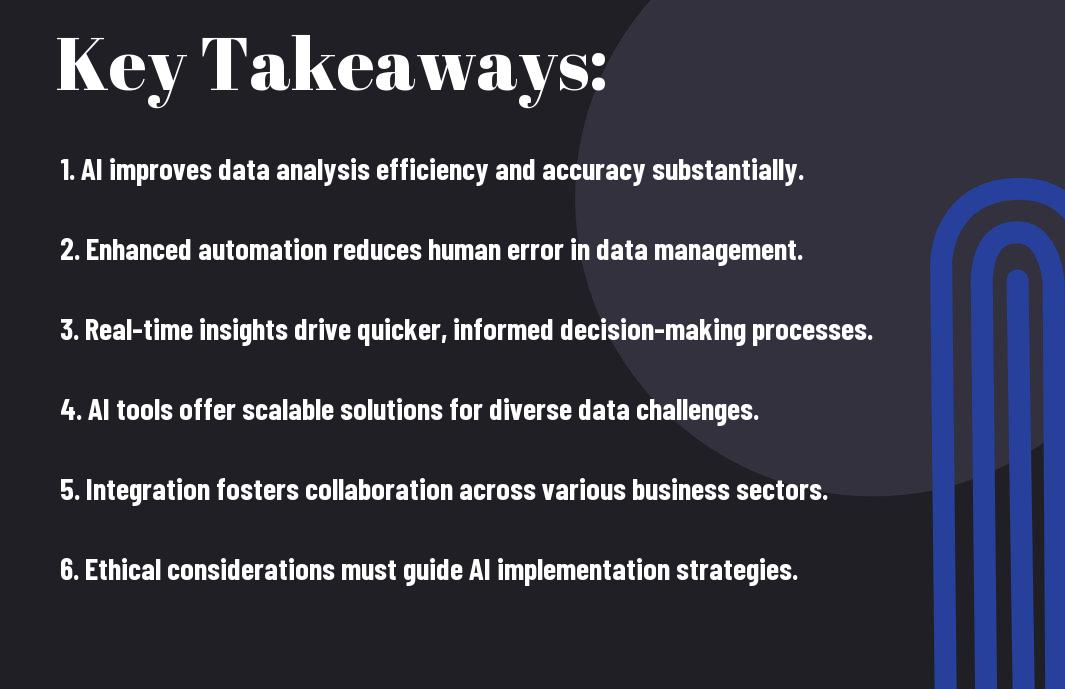Data has become an important asset in today’s digital landscape, leading to complex challenges for organizations of all sizes. You may find yourself navigating through a sea of information, seeking effective ways to harness and interpret it for decision-making. AI-infused instruments emerge as a promising solution, offering innovative capabilities to streamline data processing and analysis. In this blog post, we will explore the potential of these advanced tools in addressing modern data dilemmas, ensuring you stay ahead in the ever-evolving technological landscape.
Key Takeaways:
- AI integration in instruments enhances data processing capabilities, enabling faster and more accurate analysis.
- Adaptive algorithms allow AI-infused tools to learn from data trends, improving their effectiveness over time.
- Scalability of AI solutions provides flexibility for organizations to manage growing data complexities.
- Real-time insights generated by AI instruments facilitate timely decision-making and strategic planning.
- Accessibility of AI-driven tools democratizes data analytics, empowering a broader range of users to leverage insights.


Understanding AI-Infused Instruments
A comprehensive grasp of AI-infused instruments is imperative for navigating today’s complex data landscape. These advanced tools combine artificial intelligence with traditional data analysis methods, offering innovative solutions that enhance decision-making processes. The integration of AI in instrument design allows for smarter, more efficient handling of vast data sets, making it easier for you to extract valuable insights tailored to your needs.
Definition and Types
Between the diverse definitions and types of AI-infused instruments, you can find tools specialized in various sectors. Here’s a breakdown of some popular types:
| Type | Description |
| Predictive Analytics | Forecasting future trends based on historical data. |
| Natural Language Processing | Analyzing and understanding human language. |
| Machine Learning | Iterative learning from data to improve accuracy. |
| Data Visualization | Presenting data insights through interactive graphics. |
| Robotic Process Automation | Automating repetitive tasks to enhance efficiency. |
Recognizing the diversity in AI-infused instruments allows you to select the right tools tailored for your specific data challenges.
Key Features and Capabilities
Below are the defining features and capabilities of AI-infused instruments that can significantly benefit your data management strategies:
- Automated Data Analysis
- Real-time Insights
- Advanced Data Security
- User-Friendly Interfaces
- Scalability for Growing Datasets
Knowing these features enables you to leverage AI-infused instruments effectively, making data-related tasks less daunting and more streamlined.
Indeed, the key features and capabilities of AI-infused instruments provide numerous advantages in your data handling endeavors:
- Enhanced Predictive Analytics
- Seamless Integration with Existing Systems
- Adaptive Learning Mechanisms
- Collaboration Tools for Team-Based Projects
- Actionable Recommendations Based on Data Trends
Knowing these capabilities puts you in a stronger position to harness AI technology, driving better outcomes in your data processes.
The Role of AI in Data Management
Assuming you embrace AI in your data management strategy, you unlock new dimensions of efficiency and accuracy. AI technologies serve to streamline the handling of vast data sets, enabling you to make informed decisions based on real-time insights. By incorporating machine learning algorithms, you can automate patterns and trends analysis, which before required considerable time and human effort. Thus, AI not only enhances your ability to manage data but also elevates the overall strategic approach of your organization.
Enhanced Data Analysis Techniques
Data analysis becomes significantly more sophisticated when infused with AI capabilities. Advanced algorithms and machine learning models allow you to uncover hidden patterns, correlations, and anomalies within your data. Consequently, you gain actionable insights that improve forecasting and decision-making, enabling your organization to respond swiftly to market changes and customer needs.
Automation of Data Processing
Any organization undergoing digital transformation is bound to experience the benefits of automation in data processing. With AI-driven tools, routine tasks such as data entry, validation, and cleaning can be performed automatically, freeing your team to focus on more strategic initiatives.
This transition to automated data processing not only increases productivity but also reduces the risk of human error, ensuring your data’s integrity. By leveraging AI systems, you can facilitate seamless data integration from various sources, making it easier for you to compile and analyze information. Ultimately, automation empowers you to operate more efficiently, optimize workflows, and drive performance enhancements across your organization.
Contemporary Data Challenges
Not all organizations are equipped to tackle the burgeoning complexities of modern data landscapes. You may encounter obstacles such as data overload, management difficulties, and analytics inefficiencies. For insights on how AI instruments can navigate these issues, consider Addressing AI’s Data Dilemma With Trusted AI Solutions.
Volume and Complexity of Data
At the forefront of contemporary data challenges lies the overwhelming volume and intricacy of information. As your organization generates vast amounts of data from various sources, you may find it increasingly difficult to manage, process, and derive actionable insights from it all.
Data Security and Privacy Issues
Before implementing AI solutions, you should address the pressing concerns of data security and privacy. With rising incidents of data breaches and regulatory scrutiny, ensuring the protection of your data becomes crucial for maintaining trust and compliance.
Understanding the implications of data security and privacy is paramount for your organization. You must navigate regulations such as GDPR and CCPA while preventing unauthorized access to sensitive information. As you embrace AI technologies, prioritizing robust security measures will safeguard your data and enhance your reputation in a landscape where consumer confidence is paramount.
Benefits of Using AI-Infused Instruments
Many professionals are discovering that AI-infused instruments bring significant advantages to data analysis and decision-making processes. These tools not only streamline information handling but also enhance the accuracy of your analysis, leading to better outcomes. For instance, in AI in Healthcare: Uses, Examples & Benefits, these instruments demonstrate how AI can transform patient care and operational efficiency.
Improved Decision-Making
An AI-infused instrument aids you in making well-informed decisions by analyzing vast datasets more efficiently than traditional methods. This capability enables you to extract meaningful insights quickly and effectively, which is crucial for timely and accurate decision-making in your field.
Efficiency and Time-Saving
AIInfused instruments significantly enhance efficiency and save you valuable time. By automating routine tasks such as data processing or analysis, you can focus on more strategic activities that require your expertise. This automation minimizes human errors and optimizes workflows.
Hence, integrating AI-infused instruments into your operations not only accelerates your data handling but also liberates you from tedious tasks. You’ll find yourself with more time to engage in innovative thinking and problem-solving, ultimately leading to a heightened overall productivity in your work.
Case Studies: AI Solutions in Action
Despite increasing complexity in data management, AI-infused instruments have proven effective across various industries. Notable case studies demonstrate measurable outcomes and efficiencies.
- Retail: A company reported a 30% increase in sales by using AI for personalized marketing strategies.
- Healthcare: An AI tool reduced diagnosis time by 50%, significantly enhancing patient care.
- Finance: Automated fraud detection systems increased detection rates by 40%, curbing financial losses.
- Manufacturing: Predictive maintenance solutions decreased equipment downtime by 25% in one year.
Industry Applications
To harness the power of AI, industries from healthcare to finance are employing bespoke solutions tailored to their specific challenges. In retail, AI analyzes purchasing behavior, while in manufacturing, predictive analytics optimize supply chain operations, illustrating the versatility of AI across sectors.
Success Stories and Lessons Learned
Actionable insights derived from successful AI implementation highlight the importance of adaptability and continuous evaluation. As organizations integrate AI, they learn to refine their strategies and leverage real-time data effectively.
At the forefront of AI success stories, businesses have shown you the path to tangible results. Companies that embraced AI effectively reported enhanced decision-making processes and efficiency improvements. The lessons learned underscore the need for clear objectives and collaboration among departments, ensuring your AI initiatives align with overarching business goals. By analyzing these examples, you can adopt best practices and foster innovation in your data management strategies.
Future Trends in AI and Data Solutions
Now is the time to explore how AI and data solutions are evolving. As businesses increasingly depend on data for decision-making, the integration of advanced AI tools will shape how you harness and analyze information. Expect significant developments in automation, predictive analytics, and machine learning, which will streamline your data processes and elevate your insights.
Emerging Technologies
About the emerging technologies redefining the AI landscape, innovations like quantum computing and edge AI are transforming data processing capabilities. These advancements will enhance your ability to manage and analyze vast amounts of data, allowing for real-time insights and improved operational efficiency.
Predictions for the Next Decade
With the next decade ahead, you can anticipate that AI will play an even greater role in data-driven strategies. Integrating AI in everyday operations will become standard, enhancing everything from customer interactions to supply chain management.
To prepare for the shifts coming in the next decade, you should focus on understanding and adopting AI tools that best fit your organizational needs. Investment in training for your teams will be vital, as AI’s capabilities will be integrated widely into routine processes. Additionally, as privacy regulations tighten, you will need to prioritize ethical AI use, ensuring that your solutions are both effective and responsible.
To wrap up
With these considerations, you can see that AI-infused instruments provide innovative solutions to contemporary data dilemmas, streamlining processes and enhancing decision-making capabilities. While they offer significant advantages, it is vital for you to critically evaluate their limitations and implications within your specific context. By balancing their potential with mindful scrutiny, you can leverage these advanced tools to navigate the complexities of the data-driven landscape effectively.